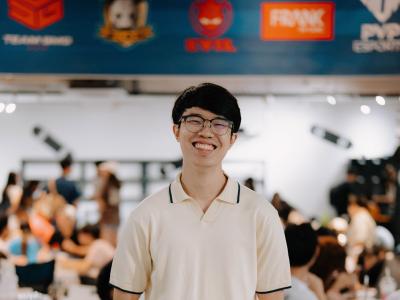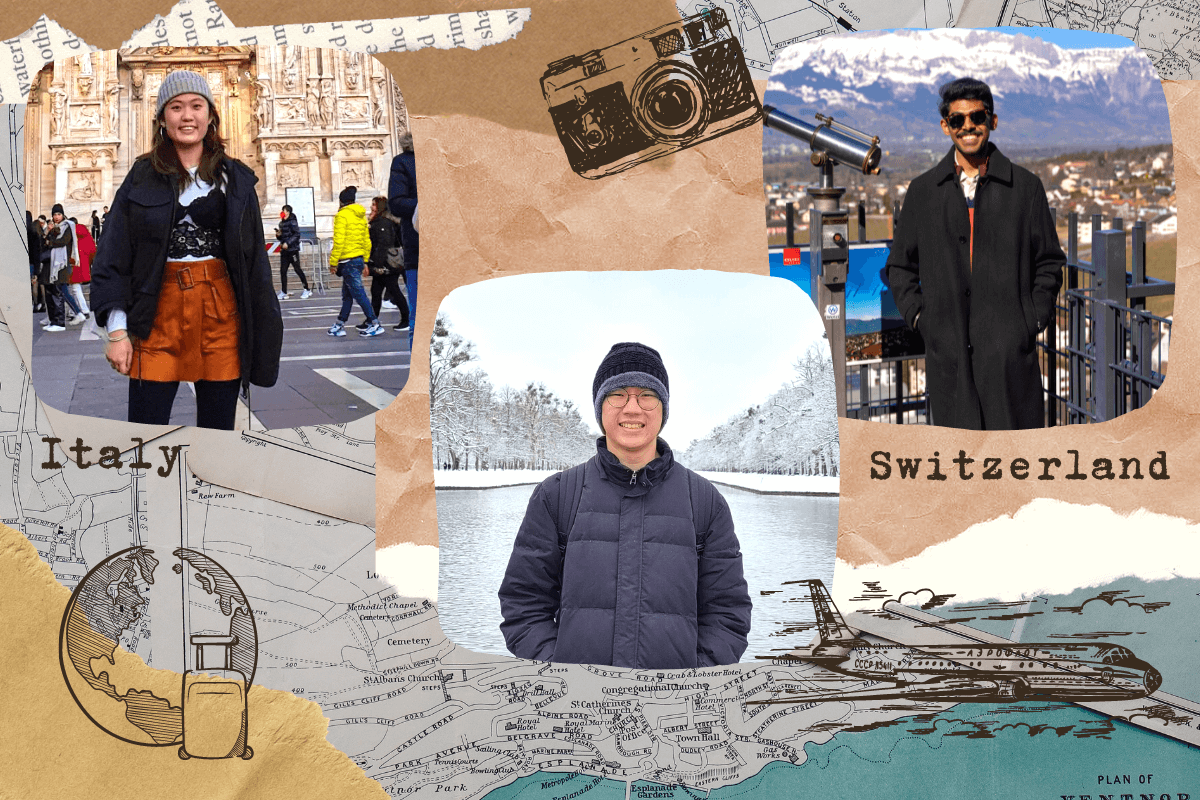
With leading universities such as Bocconi University, Erasmus University Rotterdam, Technical University of Munich, University of Manchester, University of St.Gallen and Paris-Dauphine University among SMU’s list of Partner Universities (PUs) in Europe, the region remains one of the most popular destinations for students embarking on the International Student Exchange Programme (ISEP) as part of their global exposure experience at SMU. Term Two of Academic Year 2021/22 at SMU marked a major milestone; a first batch of students ventured overseas for the first time since ISEP was suspended in 2020 as the world grappled with the Covid-19 crisis. With more than 260 SMU students fanning out to 57 PUs across myriad European cities in Term Two, we caught up with Joshua Yuen and Valliappan Arunachalam, who went to Switzerland, and Megan Cheah who chose Italy, for their insights to life as exchange students in these beautiful European cities.
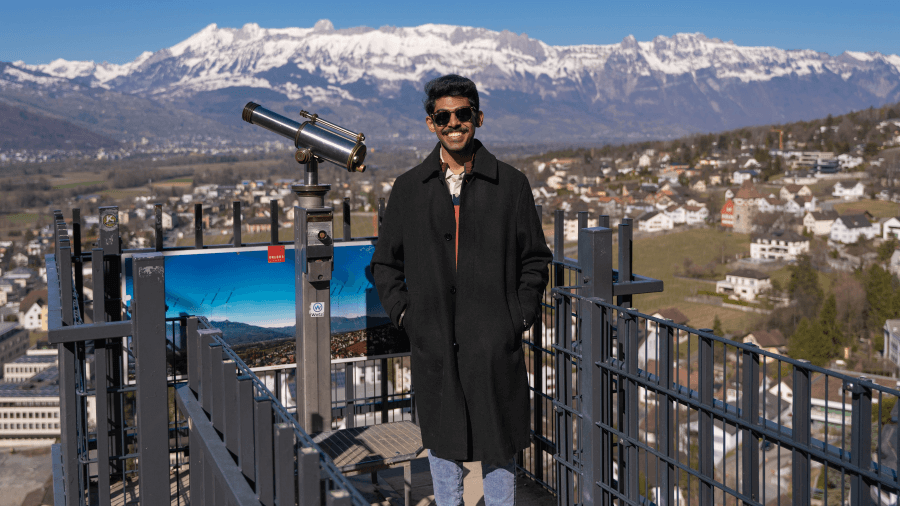
Valliappan catching a bird’s eye view of Vaduz, Liechtenstein
Valliappan Arunachalam, Undergraduate, School of Accountancy
Joshua Yuen, Undergraduate, School of Social Sciences
Host Country: Switzerland
Host University: University of St.Gallen
What motivated you to go overseas for ISEP, despite the persistence of Covid-19 globally?
Valliappan: After two years of online classes and all the uncertainty that we have had to face, I wanted a change of place. ISEP gave me that opportunity, along with travelling overseas, making new friends, and learning new cultures. It has been a few great months in Switzerland, where I have travelled, explored, learnt new things, gained confidence to be more independent and surely felt a lot better than at the start of this experience.
Joshua: For me, the goal is to gain new perspectives, be it academically or culturally. I felt that it was a good opportunity to go on an ISEP in Europe where the pandemic appears to be stabilising with vaccinations, to see how people are living with the virus and view the Covid-19 situation from a different perspective.
How would you describe travelling overseas again after not having travelled for some 1.5 years?
Joshua: Travelling was the first thing I wanted to do when the pandemic passes, but it lasted longer than I expected. I had to readjust my thinking to travel with Covid-19 still lingering in the background. It was so refreshing, to be able to leave Singapore as planned after a period of two years where border measures changed abruptly, and plans had to be modified constantly.
When I arrived in Switzerland I was surprised with the ease of customs clearance – I was able to leave the airport within 45 minutes. I was prepared for the process to take longer than normal due to the pandemic. Travelling within Europe was also very easy just like before the pandemic, which felt rather surreal because it was as though Covid-19 did not happen. Only the mask-wearing scenes served as a reminder, but even mask-wearing is now not mandatory in many parts of Europe.
What were some safe management measures taken at your host university?
Joshua: The Swiss government initially maintained a mask mandate and requirements for a vaccination certificate in indoor places and institutions of learning, so that was enforced. However, the mandate for mask wearing has since been lifted.
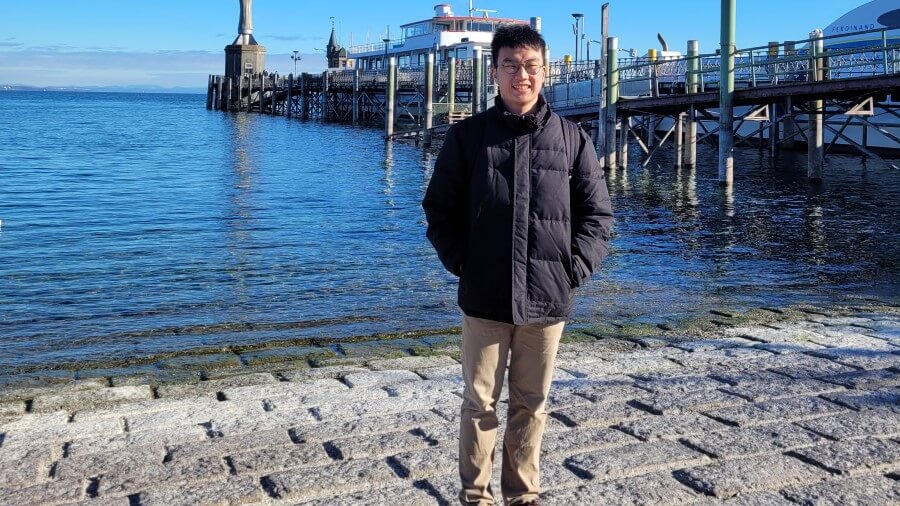
Joshua on a short trip out to Konstanz, Germany
Given the uncertainty, what additional safeguards did you take when preparing for the trip?
Joshua: There was a non-refundable administrative fee for booking student accommodations with the University. But it was a risk that had to be taken to travel in this uncertain period.
Can you share your total expenses for the entire term and other related costs?
Valliappan: I budgeted roughly S$12,000 and I spent approximately S$4,000 on rent, S$4,000 on food and necessities, S$1,000 on air tickets and S$3,000 on additional trips out of my host city. SMU’s travel insurance sufficiently covered my trip’s insurance requirement, so I did not purchase other insurance plans.
Joshua: My total budget was roughly S$13,000, with approximately S$4,200 going to rent, S$3,500 to food and necessities, S$1,450 to air tickets and S$4,000 on additional trips. It helps to stick closely to the budget, sharing costs or cooking more often than eating out.
Some items in St. Gallen are similarly priced as Singapore, but it is the currency conversion that makes it more expensive. For example, the monthly concession for public transport here in St. Gallen is 52 CHF, which is similar to Singapore’s S$52, but after factoring the conversion rate of approximately 1.5, the concession price in St. Gallen is effectively S$78. Hence, total costs vary widely according to the region you go to and the prevailing exchange rate.
Any money-saving tips for fellow SMU students who aspire to go for ISEP?
Valliappan: I booked my air tickets with Singapore Airlines, and I used their student account registration option, which gave me less expensive flight tickets and allowed me to check in baggage up to 40kg rather than the usual 25-30kg allowance.
I also booked University housing. The housing options given to us are studio apartment (individual), semi-private room (individual), shared apartment (4-6 people in one house), and double-sharing suite. I was lucky to have gotten the cheaper shared apartment where I made great friends and had a wonderful experience travelling with them. Staying with other students also enabled me to experience aspects of their lifestyles. Being able to share groceries was also a perk!
Joshua: Try to get student pricing as much as possible when travelling or when visiting tourist attractions like museums! If you plan to visit other cities or countries, either book early (airfares, train tickets, accommodations) or do more research as to how to get there, be it by rail, air, or bus as there may be cheaper alternatives available.
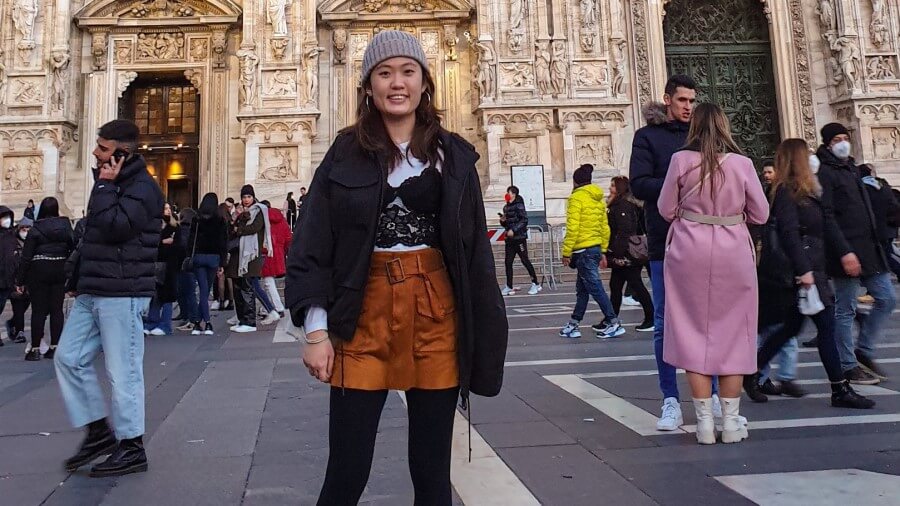
Megan at Duomo di Milano
Megan Cheah, Undergraduate, Lee Kong Chian School of Business
Host Country: Italy
Host University: Bocconi University
What motivated you to go overseas for ISEP, despite the persistence of Covid-19 globally?
I knew that I wanted to embark on an overseas exchange programme even before joining SMU. Such a programme would allow me to be fully immersed in a completely different culture, and living abroad would let me be more independent. Hence, I was really looking forward to an in-country experience and took the plunge to apply for ISEP when the programme resumed.
How would you describe travelling overseas again after not having travelled for some 1.5 years?
It felt so exciting and liberating! After not travelling for so long, everything, from checking in my luggage to touring different cities felt foreign yet invigorating.
What were some safe management measures taken at your host university?
Prior to coming to Italy, I had my vaccine certificate notarised for EU standards, known as a Green Pass. We had to have our Green Pass scanned upon entering any building in school and there were also thermal scanners placed at building entrances to ensure that no one who had a fever could enter the building. Masks were also compulsory on campus, be it indoors or outdoors and we had to adhere to safe-distancing measures.
Now, we no longer need our Green Pass to be scanned and can be completely mask-off outdoors. However, we still have to wear our masks indoors for now.
Given the uncertainty, what additional safeguards did you take when preparing for the trip?
When I was booking my air tickets with Singapore Airlines, there was some flexibility on the changes to the dates and destination. So, I went ahead to book a return ticket first and only recently updated the return date after confirming my post-exchange plans.
I booked accommodations through established platforms, ensuring that I would be refunded should the host cancel, or should the living conditions differ from what was advertised. Thankfully all went well, and I switched to paying the host directly on international currency transfer platforms which had better exchange rates.
The Italian embassy in Singapore checked my travel insurance when issuing my visa to ensure that there was sufficient coverage but for peace of mind, I also purchased additional study abroad insurance on top of SMU’s travel insurance.
Can you share your total expenses for the entire term and other related costs?
I have spent roughly S$7,450 in three months on rent, air tickets, airport transfer, permit of stay, telco bills, transport concession, daily expenses and shopping. Approximately S$4,100 was spent on rent, S$2,000 on food and necessities, S$900 on air tickets and S$450 on additional trips out of my host city. I’m estimating that I will spend an additional S$800 in my last month.
Any money-saving tips for fellow SMU students who aspire to go for ISEP?
In Europe the cost of Asian sauces is generally higher than what we are used to. A one-litre bottle of soy sauce costs around S$9, while a 400ml bottle of sesame oil is around S$6 and a 700ml bottle of oyster sauce is roughly S$9. If you plan on using such condiments I definitely suggest bringing them over!
Also check the exchange rate from time to time to convert your currency when the exchange rate is favourable. Lastly, keeping track of expenses is crucial to spending within your means.
Interested to embark on ISEP? With partner universities in more than 150 cities across 45 countries, there are diverse destinations for different budgets. You may also find more information on awards, grants and scholarships to support you on your academic endeavours abroad here. Accept your SMU offer today! Acceptance closes 24 May 22.
Effective from 17 March 2022, the newly formed Academic Services and Operations Office at SMU had taken over the management of ISEP from the International Office. In line with the lifting of the University’s suspension on SMU-sanctioned travel, we have resumed in-person formats for our global exposure programmes in a safe manner, with the health and safety of students as priority. There are additional measures taken to enable students to navigate the new normal of international travel. As always, we thank everyone for their patience, understanding and support as we ride out these challenging times together.

